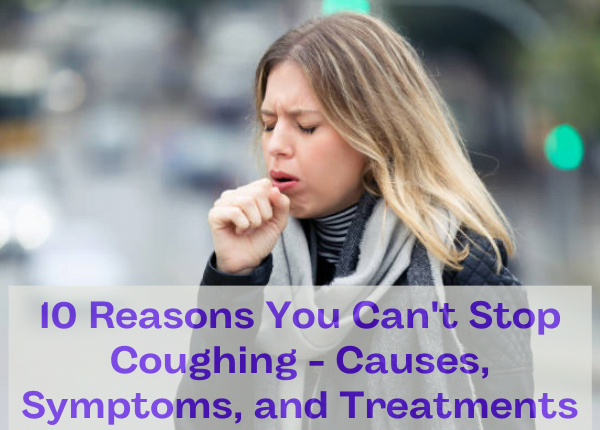10 Reasons You Can’t Stop Coughing – As humans, we cough to clear our throats and airways from irritants, viruses, and bacteria. However, excessive and persistent coughing can be uncomfortable and disruptive to our daily lives. If you’re experiencing coughing fits and can’t seem to shake it off, you’re not alone. In this article, we’ll discuss 10 reasons you can’t stop coughing, along with their causes, symptoms and treatments.
Reason 1 – Postnasal Drip
Postnasal drip occurs when excess mucus runs down the back of your throat. It can be caused by allergies, sinus infections, or the common cold. Symptoms include a tickling sensation in the back of your throat, sore throat, and a persistent cough that worsens at night. To alleviate postnasal drip, you can use saline nasal sprays, decongestants, or antihistamines.
Reason 2 – Asthma
Asthma is a chronic respiratory disease that causes inflammation and narrowing of the airways, leading to coughing, wheezing, and shortness of breath. If you have asthma, triggers such as allergies, exercise, or cold air can cause a coughing episode. Treatment for asthma includes inhalers, steroids, and allergy shots.
Reason 3 – Gastroesophageal Reflux Disease (GERD)
GERD occurs when stomach acid flows back into the esophagus, causing irritation and inflammation. Symptoms include heartburn, chest pain, and a chronic cough. Treatment for GERD includes lifestyle changes such as avoiding trigger foods, losing weight, and taking medication such as proton pump inhibitors.
Reason 4 – Chronic Obstructive Pulmonary Disease (COPD)
COPD is a progressive lung disease that makes it difficult to breathe. It is often caused by smoking and long-term exposure to air pollution. Symptoms include coughing, wheezing, and shortness of breath. Treatment for COPD includes bronchodilators, steroids, and oxygen therapy.
Reason 5 – Upper Respiratory Infection (URI)
A URI is a viral infection that affects the nose, sinuses, throat, and larynx. Symptoms include congestion, sore throat, and coughing. Treatment for a URI includes rest, hydration, and over-the-counter medications such as cough suppressants and pain relievers.
Reason 6 – Chronic Bronchitis
Chronic bronchitis is a type of COPD that causes inflammation and mucus production in the bronchial tubes. Symptoms include a persistent cough with mucus, wheezing, and shortness of breath. Treatment for chronic bronchitis includes bronchodilators, steroids, and oxygen therapy.
Also read | Coughing Foods to Avoid: What to Eat and What to Avoid
Reason 7 – Lung Cancer
Lung cancer can cause a persistent cough, chest pain, and shortness of breath. Smoking is the leading cause of lung cancer, according to the CDC. Treatment for lung cancer depends on the stage and location of the cancer and may include surgery, chemotherapy, and radiation therapy.
Reason 8 – COVID-19
COVID-19 is a highly contagious respiratory illness caused by the SARS-CoV-2 virus. Symptoms include coughing, fever, and shortness of breath. If you suspect you have COVID-19, it is important to get tested and follow quarantine guidelines to prevent the spread of the virus. Treatment for COVID-19 includes supportive care and medications such as remdesivir and dexamethasone.
Reason 9 – Environmental Factors
Exposure to environmental irritants such as pollution, dust, and chemicals can irritate the airways, leading to a persistent cough. Avoiding these irritants, wearing a mask, and using air filters can help reduce exposure.
Reason 10 – Medications
Certain medications such as ACE inhibitors, used to treat high blood pressure, can cause a persistent cough. If you suspect that your medication is causing your cough, talk to your doctor about switching to an alternative.
Also read | | Are chest infections contagious? Signs your cough is not a common cold
FAQs – 10 Reasons You Can’t Stop Coughing
Can anxiety cause a persistent cough?
Yes, anxiety can cause a persistent cough. Stress and anxiety can trigger coughing episodes
due to the body’s natural “fight or flight” response, which can cause airway irritation and inflammation. Managing anxiety through therapy and medication can help reduce coughing.
What are some home remedies for a persistent cough?
Some home remedies for a persistent cough include staying hydrated, using a humidifier or steam shower, and drinking hot tea with honey. Over-the-counter cough suppressants and lozenges can also provide relief.
When should I see a doctor for a persistent cough?
You should see a doctor for a persistent cough if it lasts longer than three weeks, is accompanied by chest pain or shortness of breath, or produces blood or phlegm. Additionally, if you have a weakened immune system or other underlying medical conditions, you should seek medical attention.
Don’t miss | Don’t miss | Why Am I Coughing So Much But Not Sick?
Is a persistent cough contagious?
A persistent cough can be contagious if it is caused by a viral or bacterial infection. It is important to practice good hygiene, such as covering your mouth when coughing and washing your hands regularly, to prevent the spread of illness.
Can smoking cause a persistent cough?
Yes, smoking is a common cause of chronic cough. The chemicals in cigarette smoke irritate the airways and can cause inflammation and mucus production. Quitting smoking can improve coughing and overall lung health.
In summary, a persistent cough can be caused by a variety of conditions, from allergies and infections to chronic respiratory diseases and even lung cancer. It is important to identify the underlying cause of your cough and seek appropriate medical treatment. Lifestyle changes, medications, and supportive care can help alleviate symptoms and improve your overall quality of life. If you have a persistent cough, it is important to take care of yourself and seek medical attention if necessary.
How long should I wait before seeing a doctor for a persistent cough?
If your cough persists for more than 2-3 weeks, you should see a doctor.
Sources |
- https://www.ncbi.nlm.nih.gov/pmc/articles/PMC3185321/
- https://www.cdc.gov/tobacco/basic_information/health_effects/respiratory/index.htm
- https://journals.lww.com/md-journal/Fulltext/2016/09130/Prevalence_of_chronic_cough_and_possible_causes_in.10.aspx
- https://www.ncbi.nlm.nih.gov/pmc/articles/PMC6340691/
- https://www.aaaai.org/Tools-for-the-Public/Conditions-Library/Asthma/Medications-May-Trigger-Asthma-Symptoms









